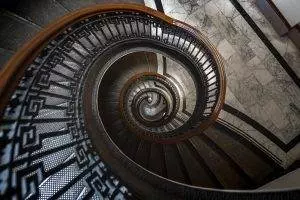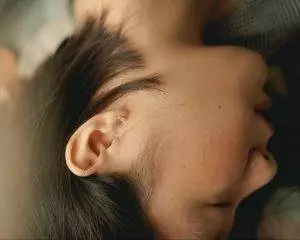By Qineng Tan, L.Ac., Ph.D. & Xiaomei Cai, L.Ac., Ph.D.

My ear feels clogged sometimes, I get sudden dizzy spells, and sometimes I think I’m losing hearing in one ear! These symptoms could be signs of Meniere’s disease, a condition of the inner ear that causes ringing in the ears or buzzing sounds, sudden hearing loss, and vertigo–that spinning sensation sometimes accompanied by nausea. Acupuncture is an effective vertigo treatment and can help resolve the dizziness and hearing problems associated with Meniere’s.
A lot of people may not realize that they have Meniere’s disease, because the most common symptoms can also be indicators of many other health issues. For example, sudden attacks of vertigo can be caused by a condition called benign paroxysmal postural vertigo, or BPPV. BPPV is another kind of inner ear problem, caused by the movement of small crystals of calcium carbonate into a part of the ear canal where they do not belong. Vestibular migraine and other types of migraine headaches can cause feelings of vertigo and ringing in the ears. Ringing in the ears, also known as tinnitus, can also be a symptom of a sinus or ear infection, thyroid problems, cardiovascular problems, or caused by repeated exposure to excessive noise levels.
Meniere’s disease is a chronic condition that can begin at any time during life, but it is most commonly diagnosed when a person is in their 40s or 50s. Most of the time, Meniere’s symptoms only affect one ear. A “Meniere’s attack” can come on in a way that is similar to a migraine. First there may be subtle signs that it is starting, like changes in hearing, or a feeling of fullness or congestion in one ear. Then, a sudden and strong attack of vertigo can make you feel so dizzy, light-headed, and off balance that you have to lie down. You may even feel nauseated to the point of vomiting. These episodes of intense dizziness can last anywhere from several minutes to several hours, or even a whole day. Afterwards, you may feel exhausted and need to rest. Never knowing when you might have one of these attacks of severe vertigo can be very disruptive and unsettling, really having a negative impact on your life.
Each person’s experience of Meniere’s disease is different, and there is no clear cause for the disorder. Over time, some people may have fewer and fewer symptomatic episodes, while other people may have them more frequently and may begin to develop more serious hearing problems. Hearing loss associated with Meniere’s disease may seem to come and go at first, but it can progress to the point of permanent hearing loss, or deafness.
What causes Meniere’s disease? Medical science is unclear as to why some people develop this inner ear problem, but it is generally believed to be related to excess fluid in the ear. Meniere’s symptoms might develop after some type of head injury or ear infection, respiratory infection, or viral infection. Meniere’s may be related in some cases to migraine headaches, or to immune system dysfunction. Some women experience Meniere’s symptoms during their premenstrual syndrome (PMS) week. As with many other illnesses, Meniere’s can be triggered by stress or anxiety. Currently, Meniere’s treatment typically involves medications that offer some symptomatic relief, like anti-nausea medications.
Acupuncture and other TCM treatments for Meniere’s disease offer a holistic way to address the varying symptoms of dizziness, vertigo, nausea, tinnitus, and hearing loss. While there is no cure for Meniere’s, it is possible to reduce the symptoms so that they are not so bothersome anymore and even to help prevent further hear loss.
Top 5 Symptoms of Meniere’s Disease

Meniere’s symptoms can be subtle at first, and a person may only have a few episodes of ringing in ear or vertigo once in a while. The common signs of Meniere’s include:
- Dizziness, vertigo, spinning sensation, light-headed
- Hearing loss, hearing problems, sudden drop in hearing, sounds are muffled
- Tinnitus, ringing in the ears, buzzing sound, roaring in ear
- Sensation of fullness in the ear, ear feels plugged up or congested
- Nausea, feeling like you’re going to be sick or vomit
In some cases, people with Meniere’s can have sudden falls, sometimes called “drop attacks,” or Tumarkin’s otolithic crisis. You may feel like you’re falling, or the room is tilting around you, and the next thing you know, you’re on the floor. These falls are unpredictable and can cause injuries.
Medical Treatment for Meniere’s Disease
One of the common treatments for Meniere’s vertigo, ringing in the ears, or a sensation of fullness in the ears is the use of diuretics like Lasix, Diamox, or Dyazide, following the logic that they will help reduce the amount of fluid in the inner ear. However, there is not much scientific evidence showing that this method works for everyone, and diuretics may have other negative consequences, such as lowering blood pressure.
Anti-nausea medications, known as antiemetics, may offer some relief from nausea during bouts of vertigo. Histamines and their receptors are understood to be involved with signalling in the brain that may impact balance, so antihistamines, such as Dramamine and Benadryl, are often offered as a way to reduce dizziness. Again, there is not much evidence of the efficacy of antihistamines for vertigo. Drowsiness is a common side effect of taking antihistamines. Antidepressants are also sometimes prescribed to help with vertigo.
In rare instances, doctors may perform surgery to physically alter the inner ear; this is called labyrinthectomy. This may help reduce debilitating vertigo for some patients or help to prevent drop attacks, but for some people, it can cause even more damage to their hearing capabilities, and can even cause deafness. All of these medical treatments only try to reduce symptoms, they don’t help to prevent hearing loss due to Meniere’s disease.
Can Acupuncture Help Meniere’s Disease?

According to TCM theory, the sensation that the ear is clogged is related to a buildup of Phlegm, causing both physical obstruction and blocking the flow of Qi (energy). Dampness and Wind are other pathogenic factors that can contribute to Meniere’s symptoms of dizziness, vertigo, and the ringing or whooshing sounds in the ear. Weak Kidney energy, combined with Wind rising from the Liver, can cause dizziness, tinnitus, and headaches. An acupuncturist will listen carefully to find out which symptoms are arising, and when, and will choose acupuncture points on the head to directly address the obstruction in the ear, as well as other points on the body to address issues with Kidney Qi.
It may be helpful to make certain dietary changes to help address the excess fluid involved in Meniere’s disease, including reducing salt and sodium, and limiting caffeine and alcohol. Your acupuncture provider will discuss nutritional choices that will help to relieve Meniere’s symptoms.
One study of Meniere’s patients treated with acupuncture showed not only that their vertigo had subsided after a few treatments, but that their hearing levels were maintained rather than worsening as treatment went on.
Another study compared patients with Meniere’s who were treated with antihistamines to a group of patients who received acupuncture treatment for 12 weeks in addition to the antihistamine medication. The patients who received acupuncture reported significantly less vertigo and dizziness, less tinnitus, and actual improvements in their hearing over the patients who received medicine only.
A review of studies using TCM methods, including acupuncture treatment, moxibustion, cupping, and herbal supplementation, to treat Meniere’s disease found that symptoms of vertigo and dizziness were, by and large, greatly reduced, to the point of patients reporting their vertigo as being fully resolved.
A study in which patients were given acupuncture and herbs for 10 days resulted in a 95% effective rate, with the majority of people treated reporting no symptoms at all after the treatment, even after a two-year follow-up.
Acupuncture Near Me for Meniere’s Disease in West Los Angeles
Vertigo is a deeply unpleasant sensation, and never knowing when an attack of dizziness and nausea may strike can really disrupt your daily life. TCM has a proven track record of effectively helping people get over symptoms like dizzy spells and ringing in the ears, and may even help to prevent further hearing loss. If you know you have Meniere’s disease, or if you have some combination of these symptoms but aren’t sure what’s going on, it may be a good time to visit a qualified acupuncturist to see if acupuncture can help relieve dizziness due to Meniere’s, migraines, or BPPV.
*This article is for education from the perspective of Traditional Chinese Medicine only. The education provided by this article is not approved by FDA to diagnose, prevent, treat and cure human diseases. It should not stop you from consulting with your physician for your medical conditions. Traditional Chinese Medicine is based on Qi, which is an invisible force that usually cannot be observed by modern science. Because science focuses on testing ideas about the natural world with evidence obtained through observation, these aspects of acupuncture can’t be studied by science. Therefore acupuncture and Chinese herbs are often not supported by double-blind, randomized trials, and they are considered alternative medicine therapies in the United States.
